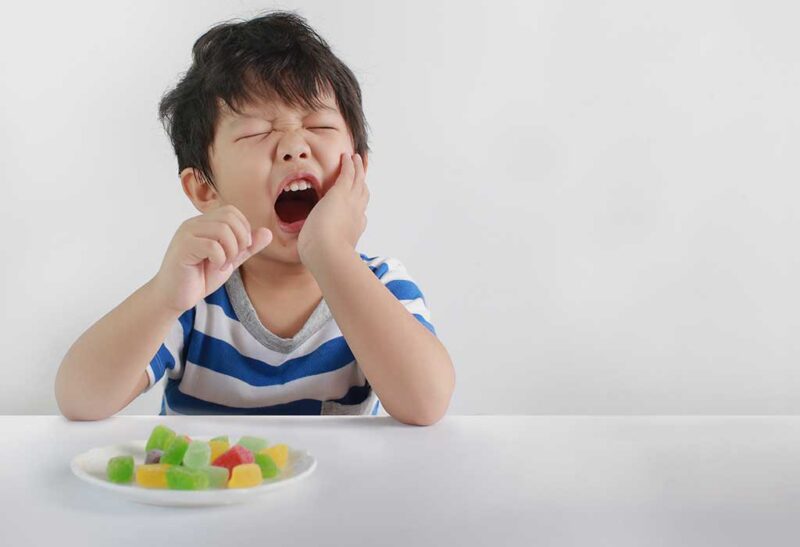Diet plays a crucial role in maintaining your child’s dental health. What your child eats can significantly impact their teeth and gums, influencing everything from cavity formation to oral hygiene. Here’s a straightforward guide on what to eat and avoid to keep your child’s smile healthy and bright.

What to Eat for Healthy Teeth
- Dairy Products
Benefits:
- Calcium-Rich: Dairy products like milk, cheese, and yogurt are excellent sources of calcium, which helps strengthen tooth enamel and bones.
- Phosphorus: Cheese and yogurt also contain phosphorus, which works alongside calcium to protect and rebuild tooth enamel.
Tip: Encourage your child to have a serving of dairy at each meal. For a fun twist, try offering yogurt with fruit or cheese sticks as a snack.
- Fruits and Vegetables
Benefits:
- Crunchy Vegetables: Carrots, celery, and apples are not only nutritious but also help stimulate saliva production, which naturally cleans the teeth and neutralizes acids.
- Vitamin-C Rich Fruits: Oranges, strawberries, and kiwi are high in vitamin C, essential for healthy gums, and help prevent gum disease.
Tip: Make fruits and vegetables a regular part of your child’s meals and snacks. Serve them fresh or creatively, like fruit smoothies or vegetable sticks with dip.
- Whole Grains
Benefits:
- Fiber-Rich: Whole grains like oatmeal, brown rice, and whole wheat bread are high in fiber, which helps clean teeth and gums as your child chews.
- Nutrients: They provide essential nutrients that support overall health, including oral health.
Tip: Choose whole-grain options for bread, pasta, and cereals. Mix entire grains into meals for added nutritional benefits.
- Lean Proteins
Benefits:
- Protein-Rich Foods: Lean meats, poultry, fish, eggs, and nuts are good protein sources, which are important for tissue repair and overall health.
- Iron: Meats and fish are also rich in iron, which helps prevent gum disease and promotes overall oral health.
Tip: Include a variety of lean proteins in your child’s diet. Try different recipes to keep meals interesting and nutritious.
- Water
Benefits:
- Hydration: Water is essential for keeping your child hydrated and helps wash away food particles and bacteria from the mouth.
- Fluoride: Tap water in many areas contains fluoride, which helps strengthen teeth and prevent cavities.
Tip: Encourage your child to drink water throughout the day, especially after meals. Avoid sugary drinks like soda and fruit juices.
What to Avoid for Healthy Teeth
- Sugary Snacks and Drinks
Risks:
- Cavity Formation: Sugary foods and drinks like candy, soda, and sweetened cereals can lead to cavities by feeding harmful bacteria in the mouth.
- Acidic Effects: Sugars create an acidic environment that erodes tooth enamel and contributes to tooth decay.
Tip: Limit sugary snacks and beverages. Offer healthier alternatives, such as fresh fruit, yogurt, or a handful of nuts.
- Sticky and Gummy Foods
Risks:
- Adherence to Teeth: Sticky foods like caramel, taffy, and gummy candies cling to teeth and are difficult to remove, increasing the risk of cavities.
- Decay Risk: These foods can break down into sugars that feed bacteria, leading to tooth decay.
Tip: Encourage your child to eat fresh fruits and vegetables instead of sticky candies. If they do consume sticky foods, make sure they brush their teeth afterward.
- Acidic Foods and Drinks
Risks:
- Enamel Erosion: Citrus fruits, fruit juices, and sodas are acidic and can erode tooth enamel over time.
- Sensitivity: Excessive acid exposure can lead to tooth sensitivity and other dental issues.
Tip: If your child consumes acidic foods or drinks, encourage them to rinse their mouth with water afterward. Limit the frequency of acidic snacks and beverages.
- Hard Foods
Risks:
- Damage to Teeth: Hard foods like popcorn kernels, ice, and hard candies can crack or chip teeth, leading to potential dental problems.
- Discomfort: Biting down on hard items can cause pain or damage to sensitive teeth.
Tip: Avoid giving your child very hard foods. Opt for softer, more tooth-friendly snacks that won’t put their teeth at risk.
- High-Starch Foods
Risks:
- Sticky Residue: Starchy foods like chips and white bread can break down into sugars and stick to teeth, increasing the risk of cavities.
- Bacterial Growth: Starches can feed bacteria in the mouth, contributing to plaque buildup and decay.
Tip: Choose whole grains over refined starches. Encourage your child to brush their teeth after eating starchy snacks.
Additional Tips for Promoting Good Dental Health
- Encourage Regular Brushing and Flossing
Routine:
- Ensure your child brushes their teeth twice daily with fluoride toothpaste and flosses daily to remove food particles and plaque.
Tip: Supervise their brushing and flossing until they develop good technique and can do it effectively on their own.
- Schedule Regular Dental Checkups
Importance:
- Regular dental visits are essential for monitoring your child’s oral health, detecting issues early, and getting professional cleanings. If you’re worried about your child’s dental health, our kids dentist in Karad can provide the care you need. Contact Chintamani Dental Home for expert guidance and support.
Tip: Schedule checkups every six months and make dental visits a positive experience to foster good oral health habits.
- Promote Good Oral Hygiene Practices
Education:
- Teach your child about the importance of good oral hygiene and how their diet affects their dental health.
Tip: Use age-appropriate books or videos to help your child understand why caring for their teeth is important.
Conclusion
A balanced diet is key to maintaining your child’s dental health. By incorporating tooth-friendly foods and avoiding those that can contribute to dental problems, you help set the stage for a lifetime of healthy smiles. Combine good dietary practices with regular brushing, flossing, and dental checkups for the best results. With these tips, you can help ensure your child’s teeth remain strong, healthy, and beautiful for years.